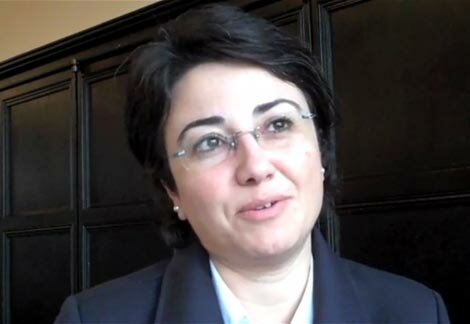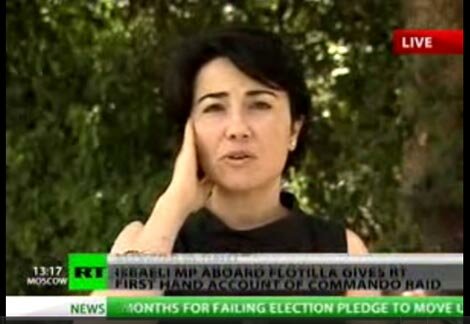
Haneen Zoabi
(Image: EI video)
By Ilene Prusher, The Jerusalem Post – 9 Dec 2012
www.jpost.com/DiplomacyAndPolitics/Article.aspx?id=295159
Wrapped in a tailored black coat and toting a stylish plaid handbag, MK Zoabi doesn’t give off impression of being much of a militant
More petite than one would expect, wrapped in a tailored black coat and toting a stylish plaid handbag, Haneen Zoabi doesn’t give off the impression of being much of a militant.
MK Danny Danon (Likud) has branded her “a terrorist disguised as a member of Knesset,” and MK David Rotem (Yisrael Beytenu) last week filed a request to ban her party, Balad, from running in the upcoming elections, saying the court should “get rid of this hostile minority.”
Related:
But her supporters, of whom there are many – judging from the people who come up to greet her warmly as she sits down for an afternoon coffee at Café Kapulsky in Umm el- Fahm – think she is a courageous and outspoken woman who refuses to be cowed by those who can’t stand to hear what she has to say, and how she says it.
“They are not against Haneen as a person, they are against the model of a Palestinian who doesn’t agree with dictates from Israel and who has his own definition of democracy which is based on humanistic values. They are against those who say that Israel is not a democracy. What’s challenging for them is that I’m suggesting a truly democratic platform,” says Zoabi, who speaks in high, passionate tones – and offers that her interviewer should stop her any time, because when she gets on a roll, she just keeps going.
Much, of course, like politicians everywhere. But Zoabi, 43, who has a BA in philosophy and psychology from the University of Haifa and an MA in communications from the Hebrew University of Jerusalem, never intended to go into politics.
Although two of her distant relatives have held positions in political life – one was a mayor of Nazareth and Knesset member, and another was a deputy minister – she grew up in a largely apolitical household in Nazareth. Her parents – her father was a lawyer and her mother a math teacher – put a great emphasis on education for their four children, of whom Haneen is the oldest.
“My parents were not active politically. They didn’t mention Palestine or what happened in 1948,” she says. “But they did talk about justice. Justice means identity, it means national pride, it means rights, and it means not to accept a Jewish state which says that Jews must have more privileges than you.”
By the age of 11, she says, she began to form her own political opinions. “Since I was 11, I started to ask, what am I, what’s the matter of Palestine? If I’m a Palestinian, then where is Palestine?”
She remembers the massacre of Palestinians in the Sabra and Shatila refugee camps in Lebanon in 1982 having a deep impact on her as a young teenager. Although from a Muslim family, she studied at St. Joseph’s, one of the best private schools in Nazareth. She was in her first year of university when the first intifada started in late 1987.
It was only in her mid-20s, when she heard a speech by Azmi Bishara, the founder of Balad, that she became interested in being more than casually involved.
“He spoke about philosophy and the French Revolution,” she says with a smile, acknowledging that it had seemingly nothing to do with the Israeli-Palestinian predicament. “For me it was very empowering and enlightening,” she recalls. “He’s brilliant.”
Bishara resigned from the Knesset and fled Israel in 2007 after being questioned by police on suspicion of “aiding and passing information to the enemy during wartime,” and of having “contacts with a foreign agent.” He now lives in Qatar.
Zoabi never thought of herself as having a personality suited to politics. “I hated the idea of being a Knesset member and to be confrontational. But I decided to do it because I represent my platform, Balad,” she says.
In 2009, she became the first Israeli-Arab woman to be elected to the Knesset on an Arab party’s list.
There were challenges to Balad’s legitimacy long before Zoabi became one of the most oft-mentioned of Arab politicians in the Knesset – and perhaps the most vilified. Bishara, party leader Jamal Zahalka and former MK Wassel Taha were investigated for visiting Syria, and Bishara was accused of giving information to Hezbollah during the First Lebanon War in 2006, a charge his supporters say was trumped up.
But Zoabi catapulted to a new level of controversial renown for taking part in the May 2010 Mavi Marmara flotilla to Gaza. She says she joined what she saw as a peaceful demonstration that included many other parliamentarians from other countries.
But the arrival of Israel Navy commandos on the deck of the ship – a chapter she didn’t witness because she was down below – was met with violent resistance from Turks involved in the IHH group. The commandos killed nine Turks in the ensuing fight. Zoabi, who incurred the wrath of many Knesset members for being on the vessel, sees the focus on her participation as a distraction from the real issues.

Haneen Zoabi after the IDF raid on the Mavi Marmara – 31 May 2010
“The anger wasn’t just because of me on the flotilla. It was because of the nine dead bodies and because of the international criticism that came with them. And it’s because Haneen gives an example to the Palestinian youth – a model of challenge,” she says, often speaking about herself in third-person, as if to acknowledge that her name is somehow becoming an icon of a different approach.
Zoabi has been raising the right-wing’s ire ever since.
Beyond the ship, she and her party find it unacceptable that the law demands that all parties running for office accept Israel as a Jewish state. Rather, she says, she supports it being a state of all its citizens – the only way Israel could call itself a democracy, she argues. For example, Balad could partner with Meretz on some issues, she says, but on more fundamental matters could not.
“They are our partners in the struggle against occupation, but not in fighting the built-in racism. We will not agree on that – we believe that Zionism is built-in racism.”
Despite several politicians’ cases against her – in return she filed an incitement complaint against Danon – Zoabi thinks that the state will not bar her party from participating in elections next month, nor ban her from running. If it did, she says, Arab voters would boycott, making it harder for Israel to hold on to its definition as a democracy. As is, only 53 percent of eligible Arab voters came to the polls in 2009, and fewer are predicted to come out this year.
“Legally, they have no case. I never imagined myself to be in the middle of a war like this. I don’t think they will disqualify me. If so, and if Balad is disqualified, there will be no election – the Arabs will not vote,” she says.
Holding the conversation in fluent English, she sometimes peppers in a word or idiom in Hebrew, and occasionally a word of Arabic. Why, she asks, should 20 percent of the public agree to be left with “fatafeel“ – with leftovers.
“We should have this fatafeel of land, of budget, of room in the workplace. For 60 years, Israel has tried to tame us and to shift us, to transform us into a minority, and we must in turn thank Israel every day, because Israel didn’t expel us in 1948.”
This week, the electioneering will start. The signs will go up all over the country, up and down the streets of Umm el-Fahm, where Zoabi had come to meet women supporters on the campaign trail. Many of them are veiled and religious, unlike Zoabi, who describes herself as a secular feminist. And whether or not they agree with her take, about half of the public Zoabi is trying to reach may not leave home on election day – whether in protest or out of apathy.
She will spend the next six weeks trying to get them to do otherwise, she says. “We don’t have the privilege to be indifferent.”
RELATED POSTS
- Adalah: The 2013 Israeli Elections and Arab-Parliamentarians
- Balad: Knesset Elections Committee disqualifies MK Haneen Zoabi from running…
- Arab-Israeli politician Haneen Zoabi disqualified from re-election
- Awad Abdel Fattah: Risk of unrest grows as Israel redraws…
- Haneen Zoabi in IOA interview: Challenge Zionism; demand equality and…




















